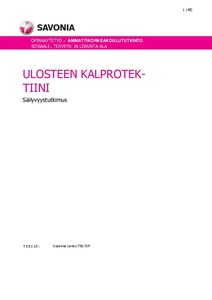Ulosteen kalprotektiini : Säilyvyystutkimus
Lensu, Susanna (2020)
Lensu, Susanna
2020
All rights reserved. This publication is copyrighted. You may download, display and print it for Your own personal use. Commercial use is prohibited.
Julkaisun pysyvä osoite on
https://urn.fi/URN:NBN:fi:amk-202004235729
https://urn.fi/URN:NBN:fi:amk-202004235729
Tiivistelmä
Kroonisiin tulehduksellisiin suolistosairauksiin (Inflammatory Bowel Disease=IBD) kuuluvat Crohnin tauti, haavainen paksusuolentulehdus sekä mikroskooppinen koliitti. Kalprotektiinimäärityksellä voidaan erottaa tulehdukselliset suolistosairaudet ärtyvän suolen oireyhtymästä (Irritable Bowel Syndrome=IBS). Ulosteen kalprotektiinimäärityksellä voidaan arvioida tulehduksen aktiivisuutta ja sitä voidaan käyttää hoidon tehokkuuden arvioinnissa.
Aihe opinnäytetyölle tuli Etelä-Karjalan keskussairaalan kliinisen kemian laboratoriosta. Opinnäytetyön tarkoitus oli tutkia kalprotektiinin säilyvyys näytteissä viikon aikana, näytteen säilymiseen liittyvien ongelmien ratkaisemiseksi. Kalprotektiininäytteitä säilytettiin -20°C, -80°C ja jääkaappilämpötilassa seitsemän ja kymmenen vuorokauden ajan, jonka jälkeen pitoisuudet määritettiin uudelleen. Tutkimuksen lisäksi opinnäytetyössä koottiin perustietoa tulehduksellisista suolistosairauksista ja kalprotektiinista.
Tulokset viittaavat siihen, että muutokset kalprotektiinipitoisuuksissa eivät ole merkittäviä ja muutokset todennäköisesti voivat johtua näytteen esikäsittelystä tai pitoisuuden vaihteluista näytteessä. Näytteet voidaan säilyttää seitsemän vuorokautta joko jääkaapissa tai pakastimessa ennen analysointia. Chronic inflammatory intestinal diseases include Crohn Disease, Colitis Ulcerosa and microscopic colitis. Chronic inflammatory intestinal diseases are called inflammatory bowel diseases (IBD). Faecal calprotectin is used as a marker for inflammation in the bowel and can also be used to distinguish irritable bowel syndrome (IBS) from inflammatory bowel diseases (IBD). Faecal calprotectin can also be used to evaluate the significance of the inflammation and the efficiency of the treatment.
The topic for this study was suggested by Clinical Chemistry Laboratory of South Karelia Central Hospital. The purpose of this study was to provide basic information about inflammatory bowel diseases and to see if faecal calprotectin samples can be stored for a week instead of 2-3 days before measuring.
The study was a quantitative research on how the length of the storage and the storage conditions affect the amount of calprotectin in the stool sample. The stool samples were stored in the temperature of -20°C, -80°C and in the refrigerator for seven and ten days. The results indicate that the changes in the amount of calprotectin in the stool sample are not significant and the changes are possibly a result of differences in handling the samples in the preanalytical phase. The samples can be stored in the refrigerator or in the freezer for seven days before analyzing.
Aihe opinnäytetyölle tuli Etelä-Karjalan keskussairaalan kliinisen kemian laboratoriosta. Opinnäytetyön tarkoitus oli tutkia kalprotektiinin säilyvyys näytteissä viikon aikana, näytteen säilymiseen liittyvien ongelmien ratkaisemiseksi. Kalprotektiininäytteitä säilytettiin -20°C, -80°C ja jääkaappilämpötilassa seitsemän ja kymmenen vuorokauden ajan, jonka jälkeen pitoisuudet määritettiin uudelleen. Tutkimuksen lisäksi opinnäytetyössä koottiin perustietoa tulehduksellisista suolistosairauksista ja kalprotektiinista.
Tulokset viittaavat siihen, että muutokset kalprotektiinipitoisuuksissa eivät ole merkittäviä ja muutokset todennäköisesti voivat johtua näytteen esikäsittelystä tai pitoisuuden vaihteluista näytteessä. Näytteet voidaan säilyttää seitsemän vuorokautta joko jääkaapissa tai pakastimessa ennen analysointia.
The topic for this study was suggested by Clinical Chemistry Laboratory of South Karelia Central Hospital. The purpose of this study was to provide basic information about inflammatory bowel diseases and to see if faecal calprotectin samples can be stored for a week instead of 2-3 days before measuring.
The study was a quantitative research on how the length of the storage and the storage conditions affect the amount of calprotectin in the stool sample. The stool samples were stored in the temperature of -20°C, -80°C and in the refrigerator for seven and ten days. The results indicate that the changes in the amount of calprotectin in the stool sample are not significant and the changes are possibly a result of differences in handling the samples in the preanalytical phase. The samples can be stored in the refrigerator or in the freezer for seven days before analyzing.
